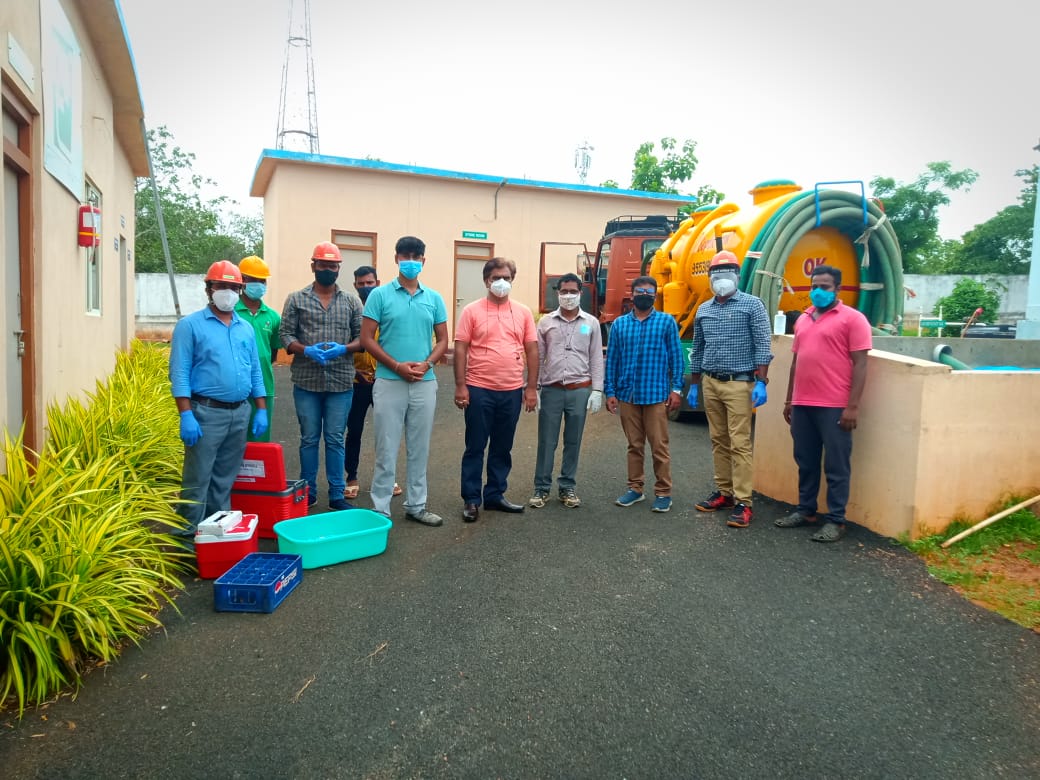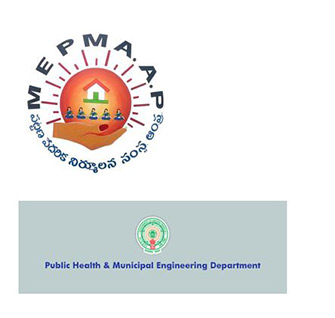 Vertical
VerticalScroll
 Vertical
Vertical






The Swachh Andhra Pradesh Mission in alignment with the Swachh Bharat Mission was launched by the Government of Andhra Pradesh to fulfill Mahatma Gandhi’s vision of ‘Swachh Bharat’ by eliminating open defecation, eradicating manual scavenging and solid cum liquid waste management activities to maintain cleanliness and hygiene in urban spaces.

To implement the Swachh Andhra Mission objectives, the Government of Andhra Pradesh set up the Swachh Andhra Corporation (SAC) in 2015 as the nodal agency. SAC collaborated with several international organizations and engineering companies as technical knowledge partners to effectively implement the mission objectives across the state. It played a key role in managing the rapid construction of Individual Household Toilets (IHHT), Community Toilets (CT) and Public Toilets (PT).

In order to achieve the goals and outcomes envisaged in the nation-wide Swachh Bharat Mission the Government of Andhra Pradesh developed a State Sanitation Strategy to proactively and systematically implement the mission across all urban local bodies. This enabled Andhra Pradesh to become one of the first states to declare its urban spaces as open defecation free (ODF)
Detailed sanitation assessment was done of the three towns of Andhra Pradesh, Narsapur, Palacole and Kovvur. The findings and learnings were shared with SAC, which was used to strengthen the state sanitation strategy and also led to the FSSM state policy
The Government of Andhra Pradesh identified and prioritized Faecal Sludge and Septage Management (FSSM) as a viable approach to address these urban sanitation challenges resulting from the inadequate waste management resulting from from the increased number of toilets constructed during SBM. A TSU led by Administrative Staff College of India (ASCI) with the support of Ernst & Young (EY) and the University of Chicago was established to design, implement and monitor.
The TSU extended implementation support to Narsapur, Palacole and Kovvur to promote citywide sustainable sanitation by providing policy, advisory and technical support to the MA&UD, GoAP. They also supported in building capacities for scaling up and adapting the FSSM & decentralized solutions developed for the pilot towns for replication to all other towns of the state.

In consultation with the Commissioner and Director of Municipal Administration (CDMA) and the Swachha Andhra Corporation, the TSU prepared policy and operative guidelines for ULBs based on their experience in the pilot towns to effectively implement FSSM across all ULBs.
The Municipal Administration and Urban Development (MA&UD) Department, GoAP endorsed these guidelines and issued a Government Order (G.O. Ms. No. 134) to all ULBs on 31 March 2017 for implementing FSSM. CDMA and SAC also issued notifications and circulars to all the ULBs describing the procedure for FSSM implementation in the city/town.
The TSU has conducted several capacity building programs to impart FSSM knowledge across government institutions at three levels- State Governments, Parastatals and Local Governments. These programs continued from 2017 to 2019
The Government of Andhra Pradesh has conducted a workshop cum review meeting on urban management with Mayors/Chairpersons, Municipal Commissioners and Municipal Engineers of all 110 ULBs in the State on 22nd and 23rd December 2016, at Vijayawada. The TSU conducted an orientation session for the participants on the concept of ODF+ and introduced FSSM, its components and means of implementation.
In November 2018, SAC team conducted regional workshops covering more than 650 municipal officials and staff covering all 110cities and towns
The TSU team oriented the ULB commissioners, elected representatives, staff and community organizers from several ULB departments on FSSM. It helped enormously in rolling-out FSSM on the ground in all 110 ULBs.


A directive was issued from CDMA office to all ULBs to identify private cesspool operators, orient them on their roles and responsibilities according to FSSM guidelines and issue ‘License to Operate’. Only licensed cesspool vehicles are now authorized to carry out emptying and transportation of faecal sludge in the respective ULB limits.
TSU team developed a mobile application to enable effective record keeping. The data can be accessed by ULBs from a web platform to monitor the private cesspool operations and estimate the waste quantities. The movement of the cesspool trucks are being monitored real-time using the GPS tracker installed on the trucks. Both spatial and historic data from the tracker can be view using a mobile application or a dedicated webpage.

To ensure 100% treatment of the sludge generated from urban households, an integrated approach leveraging existing and proposed sewage treatment infrastructure and establishing exclusive faecal sludge treatment plants in smaller towns was envisaged by GoAP.


Post successful implementation in Narsapur, GoAP scaled-up the establishment of FSTPs in all smaller ULBs where there is no treatment infrastructure existing or proposed in the future.
Swachha Andhra Corporation and the TSU strategized to create this infrastructure through public-private partnership (PPP). It encourages private sector involvement in this emerging sector and reduces the capital expenditure burden on the state. An innovative ‘Hybrid Annuity Model’ was adopted for this partnership. This PPP is for 10 years that includes 6 months for designing, building and nine and half years for operating the FSTP.

14 STPs in six cities - Visakhapatnam, Vijayawada, Rajahmundry, Tadipatri, Pulivendula and Yemmiganur have been identified to implement co-treatment of FS
GoAP is establishing 24 STPs under the AMRUT scheme in mission cities for treating wastewater. Based on the recommendations from ASCI-TSU, the Public Health and Engineering Department (PHED) under the MA&UD Department and Andhra Pradesh Urban Finance and Infrastructure Development Corporation (APUFIDC) have recommended the private developers to revise the designs of the proposed STPs to include provision for co-treatment of FS.
The Faecal Sludge and Septage Management plans were prepared for all ULBs in the state for a planned approach to implement interventions for improvement in faecal sludge management in urban areas
The water quality in the River Godavari was monitored on real-time basis to assess the levels of pollution before and after the implementation of FSSM interventions in pilot towns through state-of-art pollution tracking equipment.

In addition to the statewide IEC campaigns rolled-out by SAC, the TSU also developed several communication materials. The collaterals consist of posters, banners, standees, pamphlets and games. This communication material disseminated by SAC to all the 110 ULBs was used to improve awareness on FSSM and its implementation at the local level.
An impact assessment study was conducted across ULBs by SAC to assess the level of impact created among citizens through the IEC interventions implemented. Further, IEC/ BCC campaigns were improvised with the integration of inputs from the impact assessment study.

The National Urban Sanitation Policy recommended constituting a City Sanitation Task Force (CSTF), a multi-stakeholder group of representatives from the city to identify sanitation issues, plan for improvement and implement the interventions. The TSU established a Gender Sub-Committee (GSC) as a part of the CSTF to address these issues in the pilot towns that will be institutionalized and scaled up across all 110 ULBs in the state.
To ensure its uptake and successful implementation across the state, a dedicated leadership team from multiple government institutions involved in sanitation has been established – the Non-Sewered Sanitation (NSS) Cell. It consists of representatives from CDMA, PHED, SAC and MEPMA overseeing sanitation or wastewater-related aspects. This NSS cell at the state level ensured continued momentum for FSSM and identified the most suitable solution for current urban sanitation problems.
To ensure effective delivery of sanitation services and to monitor the operation & maintenance of toilet facilities (PTs/ CTs/ School toilets) developed, GoAP has established a centralized command control center through which regular monitoring is ensured.


A state-level consultative workshop was organized to mainstream MHM education for adolescent girls in Government Schools and improve awareness among women in urban poor settlements. The workshop was led by the TSU team on Menstrual Health Management (MHM) with key stakeholders from the Women and Child Welfare Department, State Education Department, Sarva Siksha Abhiyaan and Mission for Eradication of Poverty in Municipal Areas (MEPMA)
ASCI and WASH United have worked together to impart MHM education to girls in government schools in Andhra Pradesh. MHM equipment has been provided for school girls in government schools across several ULBs
WASH United and ASCI trained about 300 teachers, SHG women group members, and NGO staff in Andhra on MHM. These trainers will be responsible to train about 11,500 girls in 73 schools, helping to improve the overall health and educational opportunities for girls in Andhra Pradesh.
Gender Forums were constituted in the highly vulnerable slums in the three cities with participation from transgender persons, sex workers, unorganized sector workers, members of Self Help Groups (SHGs), Slum Level Federations (SLFs), Area Level Federations (ALF), town Level Federations, ASHA workers.A Government Resource Centre Forum was federated at the city level for each city involving the ULB, MEPMA, and frontline leaders and volunteers from GFs.

The Technical Support Unit established a state level FSSM Helpline to address the issues and improve the FSSM knowledge for citizens and ULBs. The Honorable Principal Secretary of MA&UD Department, Government of Andhra Pradesh, inaugurated the FSSM Helpline.
To ensure safe treatment of faecal waste generated from all rural areas, the state has planned to treat waste from nearby rural areas at the proposed FSTPs. A pilot project on rural-urban integration for safe management of faecal management has been implemented at Rajam FSTP. Faecal sludge from the nearby villages within a 14 km distance is being treated at Rajam FSTP.
Govt. of AP has appointed an Independent Engineer to ensure quality assurance and to monitor the quality control during the construction stage of 78 FSTPs on PPP (HAM) model.

Institutional partners such as MEPMA, PHED, involved in infrastructure and housing development department, river management, women and child welfare, education have been identified identified for capacity building planning

GoAP notified enhancement in the salary of sanitary workers by INR.6000 as occupational health allowance to promote workers' health and safety.
The state signed an MoU with academic institutions such as Swarnandhra College of engineering and Technology, Andhra Layola College, GITAM university to include concepts of sanitation as part of the course curriculum
Digital capacity building programs on various aspects of FSSM were curated in regional languages as a tool for upskilling and knowledge sharing among commissioners, ward secretaries, engineers and self-help groups.
Behaviour Change and Communication (BCC) Campaigns such as the Malasur Campaign has been rolled out in the state based on the insights from the impact assessment study conducted. The state has earmarked resources for BCC plans in order to mainstream FSSM.

The TSU is providing technical support in implementing decentralized wastewater treatment systems (DEWATS) in all proposed housing layouts under Housing for All scheme to ensure treatment and re-use of water within these layouts.
To promote and monitor safe cleaning of sewers and septic tanks by sanitary workers and private desludging operators across urban areas and to ensure effective implementation of provisions under Manual Scavenging ACT-2013, the State has notified to establish RSA at district level and ESRU at ULB levels.

Focus areas supporting Andhra Pradesh's FSSM achievements


The National Faecal Sludge and Septage Management (NFSSM) Alliance was convened in January 2016. The Alliance was convened to build consensus around faecal sludge and septage management. The Alliance with support from the Bill and Melinda Gates Foundation works in close collaboration with the Ministry of Housing and Urban Affairs and helped design a national policy on FSSM.

